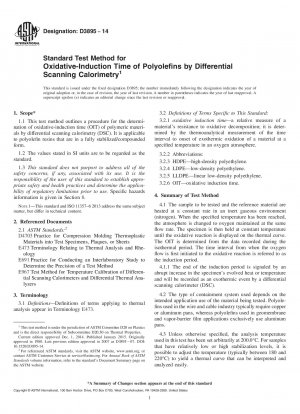ASTM D3895-14
Standard Test Method for Oxidative-Induction Time of Polyolefins by Differential Scanning Calorimetry
- Standard No.
- ASTM D3895-14
- Release Date
- 2014
- Published By
- American Society for Testing and Materials (ASTM)
- Status
- Replace By
- ASTM D3895-19
- Latest
- ASTM D3895-19
- Scope
5.1 The OIT is a qualitative assessment of the level (or degree) of stabilization of the material tested. This test has the potential to be used as a quality control measure to monitor the stabilization level in formulated resin as received from a supplier, prior to extrusion.
Note 2: The OIT measurement is an accelerated thermal-aging test and as such can be misleading. Caution should be exercised in data interpretation since oxidation reaction kinetics are a function of temperature and the inherent properties of the additives contained in the sample. For example, OIT results are often used to select optimum resin formulations. Volatile antioxidants may generate poor OIT results even though they may perform adequately at the intended use temperature of the finished product.
Note 3: There is no accepted sampling procedure, nor have any definitive relationships been established for comparing OIT values on field samples to those on unused products, hence the use of such values for determining life expectancy is uncertain and subjective.
1.1 This test method outlines a procedure for the determination of oxidative-induction time (OIT) of polymeric materials by differential scanning calorimetry (DSC). It is applicable to polyolefin resins that are in a fully stabilized/compounded form.
1.2 The values stated in SI units are to be regarded as the standard.
1.3 This standard does not purport to address all of the safety concerns, if any, associated with its use. It is the responsibility of the user of this standard to establish appropriate safety and health practices and determine the applicability of regulatory limitations prior to use. Specific hazards information is given in Section 8.
Note 1: This standard and ISO 11357–6 2013 address the same subject matter, but differ in technical content.
ASTM D3895-14 Referenced Document
- ASTM D4703 Standard Practice for Compression Molding Thermoplastic Materials into Test Specimens, Plaques, or Sheets
- ASTM E473 Standard Terminology Relating to Thermal Analysis
- ASTM E691 Standard Practice for Conducting an Interlaboratory Study to Determine the Precision of a Test Method
- ASTM E967 Standard Practice for Temperature Calibration of Differential Scanning Calorimeters and Differential Thermal Analyzers
ASTM D3895-14 history
- 2019 ASTM D3895-19 Standard Test Method for Oxidative-Induction Time of Polyolefins by Differential Scanning Calorimetry
- 2014 ASTM D3895-14 Standard Test Method for Oxidative-Induction Time of Polyolefins by Differential Scanning Calorimetry
- 2007 ASTM D3895-07 Standard Test Method for Oxidative-Induction Time of Polyolefins by Differential Scanning Calorimetry
- 2006 ASTM D3895-06 Standard Test Method for Oxidative-Induction Time of Polyolefins by Differential Scanning Calorimetry
- 2004 ASTM D3895-04 Standard Test Method for Oxidative-Induction Time of Polyolefins by Differential Scanning Calorimetry
- 2003 ASTM D3895-03 Standard Test Method for Oxidative-Induction Time of Polyolefins by Differential Scanning Calorimetry
- 2002 ASTM D3895-02 Standard Test Method for Oxidative-Induction Time of Polyolefins by Differential Scanning Calorimetry
- 1998 ASTM D3895-98 Standard Test Method for Oxidative-Induction Time of Polyolefins by Differential Scanning Calorimetry
